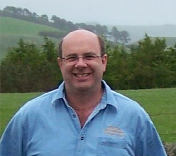 Happy New Year to all our subscribers and readers! We are pleased to introduce our International President for 2011: Duncan Monkhouse, an HTCIA member for 10 years and, as a Canadian, our first truly international president. With over 30 years of microcomputing experience, Duncan has served as IT support and development for a local police force, as a programmer and computer forensics specialist for the Royal Canadian Mounted Police, and most recently as an electronic evidence officer for the Canadian government.
Happy New Year to all our subscribers and readers! We are pleased to introduce our International President for 2011: Duncan Monkhouse, an HTCIA member for 10 years and, as a Canadian, our first truly international president. With over 30 years of microcomputing experience, Duncan has served as IT support and development for a local police force, as a programmer and computer forensics specialist for the Royal Canadian Mounted Police, and most recently as an electronic evidence officer for the Canadian government.
We asked Duncan what he anticipates for the HTCIA this coming year:
This year HTCIA celebrates 25 years as an Association. What are the thoughts of the incoming HTCIA President?
In my mind, the fact that HTCIA is 25 years old is a tremendous achievement. From our roots in Silicon Valley, California, we have grown to represent high tech investigators from around the world. This gives the membership a real opportunity to learn about different investigation techniques and different procedures from other members.
The size of the association, almost 4,000 members, means that a member has trusted contacts wherever their investigations take them. This will become more and more important as more investigations span the globe in size. The association gives the members a trusted base of experts to assist with almost any issue that crops up during their investigation.
How has membership helped your career and day-to-day work?
Membership in HTCIA has allowed me to expand my horizons to other areas of high tech investigations, and to see new trends in the field. This is useful at work as we determine what equipment and software would assist us in our investigations. The listserv is an excellent resource; just reading the messages gives you a feel for the direction of the industry, and useful tidbits that can be used in your investigations.
What are you looking forward to accomplishing in 2011?
There are a number of things that I would like to accomplish in the upcoming year. One is improved communications between the entities involved in HTCIA, the International Office, the Chapters, the members and the general public.
Another is to attempt to set a direction for the association for the upcoming years. As an association, and a member of the International Executive Committee, it is very difficult to perceive the plan for HTCIA to achieve its mandate. This is complicated by the constant change in members sitting on the International Board of Directors.
The last item is to increase the training opportunities for the members, through online training, and the International Conference.
What do you most want to see from the members/chapters?
As a rule the association provides services (meetings, training) to our members. So, it’s interesting to ask, what can the members do for us? But there are a number of things that members can do to assist the association.
Any association is only as good as its members, so invite people who might be interested in the goals of the association to a meeting. Help by volunteering for your local chapters, do a presentation (a learning experience for both you as a member and the attendees), reach out to the general public with training to assist them in understanding why what we do is important.
At the chapter level, the chapter boards need to provide regular meeting to their members, with a good program of presenters.
What are your goals as the first non-US President of HTCIA?
As the President of HTCIA, my goals are simple, to steer the ship and not run aground. This is easy, or hard, depending on the crew (International Executive Committee, and International Board of Directors). Being the first non-US President does not change these goals.
Where I can bring insight into the functioning of the International Office has to do with the interface between the International Office and the non-US chapters. The non-US chapters are already recognized in the bylaws, by being able to have a separate bank account, and depending on national laws, have defence representatives as members.
That said, there are still obstacles faced by the non-US chapters that could be removed by changing way the chapters are viewed by the association. One of the goals for the Bylaw Committee will be to look at this interface and determine if there is a better model.
Questions or comments for Duncan on our plans? Please ask in comments below, or email president@htcia.org!
 We are very pleased to announce that we’ve joined the Consortium of Digital Forensics Specialists (CDFS) as an Organizational Member! Established in 2008 to provide leadership and advocacy as the global representative of the digital forensics profession, CDFS offers the chance for HTCIA members, through their board representatives, to collectively help determine standards for digital forensics ethics, practice and professional licensing and certification, among other areas.
We are very pleased to announce that we’ve joined the Consortium of Digital Forensics Specialists (CDFS) as an Organizational Member! Established in 2008 to provide leadership and advocacy as the global representative of the digital forensics profession, CDFS offers the chance for HTCIA members, through their board representatives, to collectively help determine standards for digital forensics ethics, practice and professional licensing and certification, among other areas.


 Posted by htcia
Posted by htcia 
